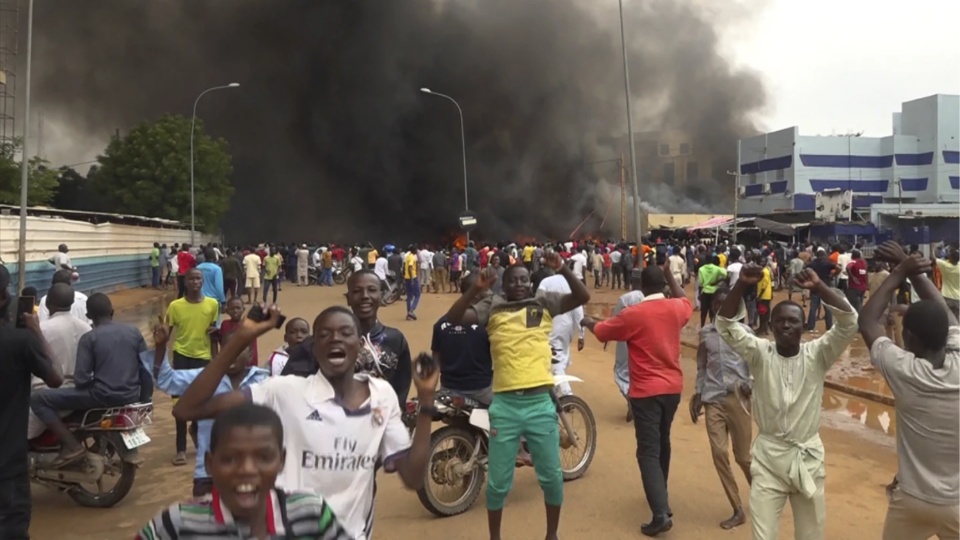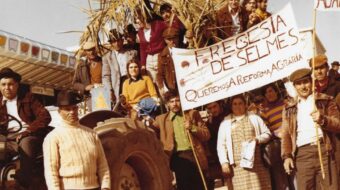
News of a military coup in the West African country of Niger has reignited condemnations of the colonial West, and marks at least the 10th coup in the Sahel region since 2008: Burkina Faso (2014, 2015, 2022), Mali (2012, 2020, 2021), Mauritania (2008), Gambia (2014), and Guinea (2021)—and all have some connection to U.S. military training via United States Africa Command (AFRICOM).
However, these coups have occurred specifically in Francophone African countries and have led to an intense backlash against that old colonial empire. So, is this a case of U.S. neocolonial aggression blowing back in the face of Western imperialism, creating a resurgence of the revolutionary potential of the region? Or is it a long-game maneuver between imperialist powers? Or is it something else entirely?
In order to begin understanding past and current developments in Africa, it is important to understand neocolonialism as a phase in the development of imperialism. The latter was briefly defined by one of its most well-known critics; V.I. Lenin called imperialism the “monopoly stage of capitalism.” As for neocolonialism, Ghanaian President Kwame Nkrumah famously said that its essence consisted of “a state which is…, in theory, independent and has all the outward trappings of international sovereignty,” but which has, in reality, an “economic system and thus…political policy…directed from outside.”
For centuries, the people of Africa suffered under slavery, oppression, and exploitation by European colonialism. The European imperialist powers in 1885 at the Berlin Conference formally split the continent amongst themselves. They stole political and economic sovereignty away from the people of the continent without any voice in the matter. Through such colonial exploitation, the surplus value derived from the continent was exported to the colonizing nations.

This process enriched the European colonial powers at the expense of Africa as a whole, resulting in the condition of “underdevelopment,” which is in reality, as Michael Parenti described, the natural endpoint of over-exploitation.
Even after the independence movements of the mid-20th century, whole industries and mineral rights largely stayed in the hands of multinational monopolies and oligopolies based in the colonizing countries, essentially sustaining systematic exploitation in spite of national independence—a phenomenon known as neo-colonialism.
For example, all iron ore produced in the southern African nation of Swaziland after gaining political independence was owned by one company, the Swaziland Iron Ore Development Company (SIODC). Despite the nation’s nominal independence, the SIODC monopoly on iron ore production was jointly owned by U.S. and British capitalists.
Currently, the Switzerland-based commodity trading and mining company Glencore is the largest extractor of cobalt in the world, and the Democratic Republic of the Congo has the largest depository. According to Bloomberg, even though Glencore’s effective monopoly in the Congo might be at an end soon due to growing investment from Chinese firms, it still has a stranglehold on the country and its natural resources.
These examples highlight the fact that the plundering of the African people and continent by Western imperialism is an ongoing colonial and genocidal project—it’s not merely past history.
France: The first colonizer
One of the worst colonial empires engaged in the region is France. France’s violent repression of the Algerian independence movement was nothing less than genocidal in its scope and brutality—echoing its genocidal actions over a hundred years prior in Haiti, and elsewhere throughout history, such as the murder of revolutionary leader Thomas Sankara in Burkina Faso.
Sankara was initially appointed Prime Minister of the Republic of Upper Volta in 1983, however, disputes with the sitting government led to his arrest. The masses then rose up in revolution. The people of Burkina Faso released Sankara and elected him president of the country. The country was soon renamed Burkina Faso—Land of the Incorruptible People—and the people, called Burkinabés—the upright people.
Under Sankara’s Marxist-oriented leadership, the young country pushed back against colonial reliance on French capital and called for African unity against Western neo-colonialism. Sankara called for Burkina Faso, and all of Africa, to be self-sufficient regarding food, energy, clothing, etc. Under his leadership, Burkina Faso also rejected the Trojan horse of “aid” from the U.S.-backed International Monetary Fund (IMF).
Sankara was overthrown and murdered in a 1987 coup orchestrated by France and led by his killer, Blaise Compaoré, who then led the country under a French-backed comprador dictatorship until 2014.
A key facet of the neocolonial control France wielded over the Francophone countries of Africa was the CFA Franc—the currency model forced on those nations when they gained political independence. The CFA Franc has a fixed conversion rate between the currencies of the imperial core and semi-colonial subjects—thus ensuring low domestic and export competitiveness of the African nations.
In July 1960, French Premier Michel Debré told Gabonese leader Léon Mba, “[w]e grant independence on the condition that the independent state endeavors to respect the cooperation agreements… The one does not go without the other.” The two banks that have an official monopoly over the CFA franc are the Bank of Central African States (BEAC) and the Central Bank of West African States (BCEAO). Both institutions are controlled by France and used as an exploitation tool, due to the aforementioned fixed rate between the CFA franc and now the Euro.
Through such manipulation, French capitalists sit on their boards and hold implicit veto power over many African nations’ economic policies, with the BEAC and the BCEAO required to deposit much of their exchange reserves in the French treasury. At first, the total reserve deposit was 100%, later reduced to 65% in 1973, and then 50% in 2005. Under these forced arrangements, the economic sovereignty of West and North Africa was explicitly still under French control.

Burkina Faso was neither the first nor the last country to reject the neocolonial oppression at the hands of the French. The nation of Guinea, under the leadership of pan-Africanist and trade unionist Ahmed Sékou Touré, rejected the CFA franc in 1960. Sylvanus Olympio, the leader of Togo, tried to exit the franc zone and create a national central bank in 1962. Mali, under Modibo Keita, the Democratic Republic of Madagascar in 1975, Mauritania in 1972, Senegal, and Cameroon all attempted to or outright left the franc zone.
This was the era of the non-alignment movement as well—with some of these African states not explicitly going down a socialist or communist route or seeking alliance with the USSR, but rather attempting to gain full sovereignty in their domestic and foreign affairs. All of these movements were ultimately undermined by France, with many of the leaders assassinated or overthrown in violent coups, regardless of their ideological alignment.
U.S.A.: The second colonizer
Up until recently, the memory of that age of revolutionary Africa was suppressed, but geopolitical and class dynamics have dramatically shifted. The rise of the U.S. as the world’s hegemonic empire in the postwar period has created occasionally conflicting actions among the imperialist powers. The U.S. has 29 known military bases on the continent in 15 countries—while France has military bases in only 10.
Many of the aforementioned West and North African states have been host to decades-long Western military presences, along with economic exploitation and underdevelopment. After the NATO-led destruction of Libya, and the U.S. imperialist wars in West Asia, Islamic extremist groups “swept from southern Algeria to Côte d’Ivoire, from western Mali to eastern Niger,” according to research from the Tricontinental Institute.
This gave Western powers an excuse to launch military interventions like Operation Barkhane in Mali in 2014. French forces built new bases in the country but failed to handle the rising Islamist insurgency.
The importance of the Sahel region cannot be overstated. Burkina Faso and Mali themselves represent the fourth and third largest gold producers in Africa, along with maintaining sizable deposits of copper and other rare earth minerals. The gold industry in Burkina Faso alone generates a minimum of $2 billion in profit annually—the majority of which goes to Canadian and Australian mining firms. Yet, 40% of Burkinabés live below the poverty line.
In Niger, the vast uranium ore deposits are used to power 1/3 of all of the lightbulbs in France—yet more than 80% of Nigerians don’t have electricity of their own, and about the same number are living in poverty. The UN reported last year that 18 million people in the Sahel region are at risk of starvation, yet the UN also reported that approximately 30% of the world’s mineral reserves, 12% of the oil, 8% of the natural gas reserves, 65% of the arable land, and 10% of the renewable fresh-water sources are in Africa.
Likewise in 2014, the regime that had overthrown the socialist state of Burkina Faso under Sankara, the Compaoré dictatorship, was finally overthrown in a coup. This was in the middle of a wave of coups in the region as previously mentioned—all of which had deep ties to the AFRICOM training apparatus that was created for U.S. neocolonial control in Africa.
However, from 2008 to 2021, these coups seemed to reinstall bourgeois compradors to leadership positions that capitulated to the West. These recent coups in Mali, Burkina Faso, (both in 2022), and now Niger have taken on a different class and international character.
Each is seemingly from the same general group of African military officers trained by AFRICOM: Assimi Goita (Mali), Ibrahim Traoré (Burkina Faso), and Abdourahamane Tchiani (Niger) all received some degree of military training from the U.S. Africa Command.
Blowback?
Therefore, conventional wisdom would dictate that these military leaders were intentionally supported in unstable countries because the West thinks they will be capable of preserving the neocolonial order and continuing the “global war on terror” that also created the extremist issue in the Sahel region in the first place. However, judging from all actions and rhetoric since their respective coups, the exact opposite appears to be happening.
In a direct nod to the historic ties between Sankara and the revolutionary Sandinistas in Nicaragua, current Prime Minister Apollinaire Joachimson Kyélem De Tambèla visited the country to commemorate the 44th anniversary of their revolution, saying, “When I came here, many people told me, if you meet Daniel Ortega, greet him on my behalf, so I greet him on behalf of all Burkinabés.”
Traoré at the recent Russia-Africa Summit held in St. Petersburg—his mere attendance is seen as an affront to Western imperialism—asked, “Why does the resource-rich Africa remain the poorest region of the world?”
He continued, saying, “African countries have suffered for decades from a barbaric and brutal form of colonialism and imperialism, which could be called a modern form of slavery…. The heads of African states should not behave like puppets in the hands of the imperialists. We must ensure that our countries are self-sufficient, including as regards food supplies, and can meet all of the needs of our people.” He concluded his remarks by echoing famed revolutionary Che Guevara: “Victory to our peoples! Homeland or death!”
The coup in Niger has been threatened outright by the Macron government in France. “The President will not tolerate any attack against France and its interests,” his office said in a statement, according to Reuters. France and the U.S. have cut aid to the country in an effort to starve out any potential change similar to Burkina Faso and Mali.
Niger, in response to aid being cut by Western countries, suspended all export of uranium and gold to France. Allegedly, according to the Africa Archives, Niger’s new leadership also told the U.S. to “keep their aid and give it to their millions of homeless people…charity begins at home.”
At the Russia-Africa summit in late July, President Vladimir Putin declared that his government would forgive 90% of the debt African countries owe Russia, totaling some $23 billion USD, and promised infrastructure development plans, as well as access to food and technology. Further, six African nations were given 50,000 tons of free grain—Burkina Faso, Zimbabwe, Eritrea, Mali, Somalia, and the Central African Republic. All of these measures appear to be directed toward undermining the influence of Western imperialist powers.
What future for the Sahel region?

The Sahel region saw intense revolutionary potential in the 20th century and was brutally repressed for decades as a result. The accumulation of oppression appears to have hit a class boiling point along with the developing geopolitical dynamics, creating a volatile situation across the region.
The people of the region have clearly had enough of neocolonial exploitation and perpetually being trapped in these crises. Are these coups directed against imperialism, and taking up the mantle of revolution? That remains to be seen, though the masses appear to have taken the streets in some cases, expressing support for the new governments. There have, of course, also been protests demanding the restoration of the incarcerated President Bazoum.
The class antagonisms under French and Western neocolonial control never brought about much economic improvement for millions of people in the region; instead, the working and oppressed people found that their quality of life only worsened over the past decades.
The military training by the coup leaders from the U.S. may yet prove to be another case of foreign policy blowback. There have been many coups before these, but none have successfully removed the presence of French influence and resisted U.S. neocolonialism. Has such a process of national liberation begun? That remains to be seen.
Neither the coup nor the suspension of constitutional processes is an ultimate solution to Niger’s desperate situation, but a continuation of the situation in Niger before the coup, as one of the most destitute and impoverished sovereign nations in the world, was also completely untenable.
But one thing is certain: Western imperialism requires a subjugated Africa in order to sustain itself. Only time will tell if neocolonial repression will strike again, or whether the people of Africa will be able to finally retake their full sovereignty.
For onlookers living outside of Africa, it is clear that however the situation develops, it is more imperative than ever that the spirit of international solidarity be placed first and foremost. The urgent needs of the people of Niger must be addressed; suspension of authentic food and humanitarian aid will not help Nigeriens. True aid should not be used as a tool of punishment by Western powers.
Any attempt by imperialist forces—either the U.S. or France—to intervene militarily must be resisted, as such interference would likely serve as a precursor to civil war and further conflict. Working and oppressed people of the world must stand united in pursuit of peace and justice—in Africa and for all mankind.
This article reflects the opinions of its author.
We hope you appreciated this article. At People’s World, we believe news and information should be free and accessible to all, but we need your help. Our journalism is free of corporate influence and paywalls because we are totally reader-supported. Only you, our readers and supporters, make this possible. If you enjoy reading People’s World and the stories we bring you, please support our work by donating or becoming a monthly sustainer today. Thank you!












Comments